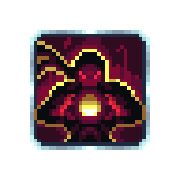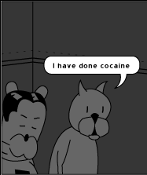|
potatocubed posted:
Having never played it myself, what did you hate?
|
|
|
|

|
| # ? May 20, 2024 15:27 |
|
I love Legacy, but I want more crunch.
|
|
|
|
Tsilkani posted:Personally, I'd never drop a dime on something where all the game info isn't self contained in a pdf or epub or book. I don't want to have to rely on someone else continuing to care about their product for me to be able to use it. I have lost track of how many indie games I've found over the years that no longer exist because the website disappeared or the creator moved on or was forced out of the space. Having a separate tutorial or starter guide is good, but don't confine the actual game to a website. It's a fair point! In the Leper's Ideal Doc Plan model, we have actually planned for the full lifecycle of the docs, including some point at which they may enter a deprecated or legacy state, accounting for the potential closure or bankruptcy of the game company, and ensuring there's a clear line of succession for its ownership and custody. Essential to this is licensing language that allows the entire project to be released to public domain when it's no longer generating significant profit (or at any other time the owner wants). Rules hosted on standardized platforms like wiki can be trivially cloned. I'd want to ensure online game components are never locked away from customers. As an aside, in my professional role, we now include maintenance and decommissioning as part of our documentation planning. When a partner asks our team to publish something, we always make it clear who is going to keep it up to date, and that we may (e.g, will) retire the doc if/when the product team that nominally owns it stops maintaining it. That's how it ought to work everywhere, but it's sadly quite rare; abandoned, obsolete documentation is the norm, even for huge very wealthy companies who can absolutely afford the resources it'd take to clean up their poo poo.
|
|
|
|
CitizenKeen posted:Personally, I don't want the setting. I want to run a big, sweeping post-apoc or supers-family game, the kind of sweeping epics I hear about from Burning Wheel. But I can't read Burning Wheel. You definitely can read Burning Wheel; you don't want to read Burning Wheel, because it's challenging for you in ways that it isn't for some other folks, and the effort you perceive it to take to learn the system exceeds what you're willing to expend. And honestly, as harsh as that sentence sounds in text, I get it! People learn and absorb information in different ways, and maybe Burning Wheel's presentation isn't working for you in text. I know I'm more of a visual learner, and absorb some texts much better when heard than when read. So if the system genuinely does something you're interested in - and if "sweeping epics" with thoughtful mechanical crunch is what you're looking for then I can confirm that it does - maybe it's worth looking in to some Actual Plays and picking up the rules through immersion? Once you see them in action, it might reorient the text in ways that make it work for you simply as a reference manual. The best Burning Wheel APs I'm familiar with are all Adam Koebel stuff, and while they are absolute master-classes in showcasing system to new players, I suspect they're off the table for most folks here. That said, I've heard excellent things about Inquisition of Blood, although I haven't listened to it myself.
|
|
|
|
Kestral posted:You definitely can read Burning Wheel; you don't want to read Burning Wheel, because it's challenging for you in ways that it isn't for some other folks, and the effort you perceive it to take to learn the system exceeds what you're willing to expend. And honestly, as harsh as that sentence sounds in text, I get it! People learn and absorb information in different ways, and maybe Burning Wheel's presentation isn't working for you in text. I know I'm more of a visual learner, and absorb some texts much better when heard than when read. So if the system genuinely does something you're interested in - and if "sweeping epics" with thoughtful mechanical crunch is what you're looking for then I can confirm that it does - maybe it's worth looking in to some Actual Plays and picking up the rules through immersion? Once you see them in action, it might reorient the text in ways that make it work for you simply as a reference manual.
|
|
|
|
CitizenKeen posted:You are absolutely correct. I can't read Burning Wheel in the same way that I can't even. I tried twice and gave up, then played Torchbearer and loved it (for the most part, I absolutely loathed parts of it that I thought were poorly thought out), and I tried again and even knowing Torchbearer couldn't bear to read it. I suppose it is time to make my annual attempt. Maybe itís a mood thing? Like, wizard speak aside, Burning Wheel is really conversationally written. I had problems fully getting the rules in action for a while because itís a super high-crunch game, but I never had a problem getting through the book. I got it as a gift and wound up eating through the whole gold edition monster book in one long sitting (ignoring smoke breaks and that I only skimmed big chunks of the skill list and stuff). You could try it in a relaxing setting with a glass of wine or something. Or not, Iím not trying to make anyone play a game I like, and more just wanting to be helpful.
|
|
|
|
I love reading Burning Wheel. I think it's among the most beautiful and evocative games I have ever read. Playing it was way too hard though; even with limiting the number of subsystems I introduced, like the starting scenario suggests, nobody enjoyed the thought of having to essentially learn a new mini-game for every type of conflict. Apocalypse World really took the best ideas of that game and concentrated them into systems small enough that even someone unfamiliar with indie rpgs or rpgs in general could get up and running in no time.
|
|
|
|
Pathfinder 2e has really spoiled me with all the rules material being available online. it's so useful
|
|
|
|
ninjoatse.cx posted:Having never played it myself, what did you hate? Well, this was about 10 years ago and I've since given away my books so you're not going to get chapter and verse on this stuff, but here's what I remember:
My big criticism, though, is that the much-vaunted minigames suck. I was trying to play a talky character so I engaged with the debate minigame a lot, and it quickly became apparent that the optimal strategy is always Point-Point-Point. Nothing is more efficient at depleting your opponent's debate hit points, there are no effective countermeasures against it, and -- more broadly -- because there's no way of predicting your opponent's plays or sending false signals about your own plays, all of the fancy rock-paper-scissors stuff in the rest of the system is a mechanical trap. The combat minigame isn't quite as bad because the potential of your character getting killed (or being removed from the story because they're recovering from a wound) is usually worse than whatever you're going to lose from the debate, but it still has the signalling problem: you're just guessing what your opponents are going to do, so you can't outplay them, just get lucky. Or not.
|
|
|
|
CitizenKeen posted:I love Legacy, but I want more crunch.  e: I lied about the emptyquote. I want a decent, non-gonzo, D&D faux-simulationist style post apocalypse game. Gimme tables of loot and bandits attacking caravans and "What do you think happened" limited to when they've gone completely off module. Splicer fucked around with this message at 10:52 on Feb 10, 2022 |
|
|
|
I have just the game for you!
|
|
|
|
I've said it before but if someone could make a decent medium crunch game with tactical combat in the Shadowrun vein of "Anime Cyberpunk meets Dungeon Fantasy" but without that game's baggage(either in system or setting) they would probably get a rather significant chunk of money from me
|
|
|
|
We have very differing opinons on the meaning of words
|
|
|
|
Yeah, these are fairly similar to my feelings on the system, i would still probably play Burning Wheel if someone asked me to, but I also felt Beliefs tended to require way too much individual PC autonomy to really make work, because of how Crane explains how to use them. I do appreciate that they're kind of force feeding you the good RPG habit of having your character have something they really want to be doing, but I think it's a bit too rigid for that purpose. And generally speaking, in most campaigns, you can't really challenge everyone's beliefs at all times at a table- someone will get the spotlight for their beliefs, and the others will generally have to be in support of that. I think it's actually not too bad for 1-1 games though.
|
|
|
|
For what it's worth, I think Burning Wheel as a text is very well written, engaging, and clear. It has rules summaries at the end of each chapter for reference. If it's difficult to learn the system by reading the book, I think that's mainly down to it being a very very complex system that is simply hard to learn.potatocubed posted:
Even as a Burning Wheel fan, most of this is true. The character power thing is absolutely true and a matter of their design philosophy. The idea being that it doesn't matter if you're competent or incompetent, you can still fight for your beliefs, which is the express focus of the game. The sample Skill obstacles always seemed high to me too, and I've never been sure if it's just a matter of the game expecting players to game the system really hard with helping and forks and etc on every roll, or if the expectation is that you'll just be constantly failing forwards. It's been a while since I read the book, but I don't think your 0 stat thing is right - I'm pretty sure that if you have 0 wealth, you can improve that by finding some $$ as bonus dice (reward loot or a loan) and then succeeding on a roll with them to buy something. The point/point/point thing is my biggest issue with it, too. Ages ago on the BW forums I made a spreadsheet to model the subsytems and found that if you and your opponent are roughly equal in dice, it is strictly optimal to script nothing but points. Trying to defend would be likely to get you hurt worse than going all offense. Same thing but moreso if you are at a dice disadvantage - trying to defend at all will get you destroyed. If you have a big enough dice advantage, it becomes optimal to start scripting rebuttals and split offense/defense, which could give the player at a disadvantage a reason to try to feint - but if they sprinkle in even just a couple of feints, you should be right back to scripting nothing but points. If I were to play in a BW campaign, this would be the one thing I would just houserule - otherwise I'd just be bored with the minigames. You mention the signalling problem, and with fights there is signalling via your opponent's gear (do they have a shield or a spear or what?), but with duel of wits, the signalling is more opaque. There is still some because different actions require different skills and you can probably tell what an NPC is likely to be good at based on their personality, but it's minor and it's not something that changes over the course of the fight. I've thought a lot about this because I tried to fix these problems with Strike!'s minigames - particularly Chase. In Chase, what action is optimal depends on your relative positions, but then your opponent knows this just as well as you do and can try to predict your move. So you don't have any one dominant optimal move, and you have real info to try to use for predictions.
|
|
|
|
potatocubed posted:My big criticism, though, is that the much-vaunted minigames suck. I was trying to play a talky character so I engaged with the debate minigame a lot, and it quickly became apparent that the optimal strategy is always Point-Point-Point. Nothing is more efficient at depleting your opponent's debate hit points, there are no effective countermeasures against it, and -- more broadly -- because there's no way of predicting your opponent's plays or sending false signals about your own plays, all of the fancy rock-paper-scissors stuff in the rest of the system is a mechanical trap. The combat minigame isn't quite as bad because the potential of your character getting killed (or being removed from the story because they're recovering from a wound) is usually worse than whatever you're going to lose from the debate, but it still has the signalling problem: you're just guessing what your opponents are going to do, so you can't outplay them, just get lucky. Or not.
|
|
|
|
potatocubed posted:My big criticism, though, is that the much-vaunted minigames suck. I was trying to play a talky character so I engaged with the debate minigame a lot, and it quickly became apparent that the optimal strategy is always Point-Point-Point. Nothing is more efficient at depleting your opponent's debate hit points, there are no effective countermeasures against it, and -- more broadly -- because there's no way of predicting your opponent's plays or sending false signals about your own plays, all of the fancy rock-paper-scissors stuff in the rest of the system is a mechanical trap. So what you're saying is, the most effective strategy in the debate minigame is a gish gallop? Because that sounds like he accidentally modeled actual debate.
|
|
|
|
Mirage posted:It's possible to run D&D in an Apocalypse World-ly fashion, where the players have story autonomy and there's more options in encounters than stabbing monsters for XP. You have to house-rule huge chunks of it, though. Honestly, PC XP is almost completely vestigial in D&D at this point. Their Organized Play doesn't use it. Their recent 1st-party adventure books don't really use it. I can't remember the last game I've seen in the wild that used it. It's just milestones now, in other words, "You level up when the DM says you do".
|
|
|
|
Toshimo posted:Honestly, PC XP is almost completely vestigial in D&D at this point. Their Organized Play doesn't use it. Their recent 1st-party adventure books don't really use it. I can't remember the last game I've seen in the wild that used it. It's just milestones now, in other words, "You level up when the DM says you do". My group has been using that style of leveling in 3.0/3.5/PF1 for years now.
|
|
|
|
lol groups I played in abandoned "xp as given from the book" in the early 1980s. We wanted to level at a reasonable pace for how frequently we met to game, not based on how much loot we extracted or things we killed.
|
|
|
|
Well just for kicks and contrariness I'm doing XP in my current 4E game and it's kinda refreshingly oldschool. And right now my group has a choice between going down the mission critical path or doing some side stuff just to level up, which in turn would reveal a whole new dungeon area to them, an effect we wouldn't get with milestone leveling. But in general I vehemently agree that milestone leveling is the way to go no questions asked.
|
|
|
|
Toshimo posted:Honestly, PC XP is almost completely vestigial in D&D at this point. Their Organized Play doesn't use it. Their recent 1st-party adventure books don't really use it. I can't remember the last game I've seen in the wild that used it. It's just milestones now, in other words, "You level up when the DM says you do". I do have to give a deep sigh to the Pathfinder AP which uses milestone levelling but also awards the PCs bonus XP for certain tasks. Since the bonus XP isn't anywhere near enough to reach the milestone level early it's basically meaningless. Nice.
|
|
|
|
hyphz posted:I do have to give a deep sigh to the Pathfinder AP which uses milestone levelling but also awards the PCs bonus XP for certain tasks. Since the bonus XP isn't anywhere near enough to reach the milestone level early it's basically meaningless. Nice. Honestly, if they just said "yes, the random bits of bonus XP probably won't matter, they're just there to make everyone feel textually rewarded for doing cool things", I wouldn't even mind.
|
|
|
|
Toshimo posted:Honestly, PC XP is almost completely vestigial in D&D at this point. Their Organized Play doesn't use it. Their recent 1st-party adventure books don't really use it. I can't remember the last game I've seen in the wild that used it. It's just milestones now, in other words, "You level up when the DM says you do". We're doing XP leveling as a change of pace for Out of the Abyss and... yeah not sure how this is going to end up, I assume we'll switch back to milestone eventually
|
|
|
|
potatocubed posted:Well, this was about 10 years ago and I've since given away my books so you're not going to get chapter and verse on this stuff, but here's what I remember: Looking at this list, I say this in the kindest way possible: you didn't understand the rules, and you played the game wrong. I can address all of these points individually and correct them, but you seem pretty angry about Burning Wheel, so unless you want me to, I won't expend the time and energy. For everyone else, I'll just say that that list is a mix of "got the rules wrong" and "was playing the wrong game for their needs." (Put it this way: knife-fighters are one of the deadliest melee builds in Burning Wheel, for one thing) One thing I can't just let go, though, is this: quote:My big criticism, though, is that the much-vaunted minigames suck. I was trying to play a talky character so I engaged with the debate minigame a lot, and it quickly became apparent that the optimal strategy is always Point-Point-Point. Nothing is more efficient at depleting your opponent's debate hit points, there are no effective countermeasures against it, and -- more broadly -- because there's no way of predicting your opponent's plays or sending false signals about your own plays, all of the fancy rock-paper-scissors stuff in the rest of the system is a mechanical trap. The combat minigame isn't quite as bad because the potential of your character getting killed (or being removed from the story because they're recovering from a wound) is usually worse than whatever you're going to lose from the debate, but it still has the signalling problem: you're just guessing what your opponents are going to do, so you can't outplay them, just get lucky. Or not. "Point-Point-Point is the only viable strategy in Duel of Wits" is how you can tell someone hasn't understood the text. In fairness, this specific point (heh) comes up a lot, because Burning Wheel is a game you're expected to play in 30+ session campaigns, and the issues with P-P-P Forever are most clearly visible a long campaign where you can see the consequences of your actions stack up over time and make you wonder how the hell you got there. For the people reading this who haven't played BW, the idea behind Duel of Wits is that each player - not character, but player - sets their stakes in the upcoming social conflict: "If I win, you do X." You can't make someone change their mind, but you can make them reluctantly do something, and the consequences of the Duel are binding on the players. Usually these stakes are tied to one of your character's Beliefs, which tend to be a combination of something you believe and something you'll do ("It is better to die free than live under the Shadow, I will raise this valley in rebellion"). These are far and away the most important things on your character sheet: they're what you derive a lot of advancement from, and pursuing them gives the meta-currencies that let you fiddle with your dice rolls. They're also things that you, as a player, are interested in and want to pursue in-game, and for Duel of Wits in particular, this is important. Each side in DoW has what amount to social HP, called disposition. When your disposition goes to zero, you lose the duel. But Duels of Wits aren't all-or-nothing: as your disposition goes down, you'll be forced to make compromises on your stakes even if you win, and those compromises are explicitly, in-the-text meant to hurt. Being forced to make a major compromise should "feel like losing," according to the text, and actual play bears this out. This feeling gets compounded because you're probably going to have to compromise one or more of those Beliefs, the ones that you as a player are personally invested in and trying to advance. This is where the Point-spamming strategy starts to run into trouble: P-P-P is all-offense, no-defense, and while it gives you a good chance of winning against an equally skilled opponent, you're almost certainly going to have to compromise heavily. Duel of Wits aren't a win/lose binary, they're a continuum of outcomes, and when you go in guns blazing with nothing but Points, most of those outcomes are that the Point player pays a heavy price and ends up wondering whether they should have done it differently. That said, P-P-P and its cousin Dismiss-Hesitate-Dismiss have their place: namely, when the duel is wildly uneven. If you hilariously outgun someone and you can blow their disposition away before they're able to score meaningful hits on you, go for it. Likewise, if you're arguing against someone you don't have much chance of success against, the correct strategy is to gun for a compromise instead of total victory: they're going to get what they want, but you're going to make it hurt and get something for yourself, too.
|
|
|
|
Kestral posted:One thing I can't just let go, though, is this:
|
|
|
|
Kestral posted:This is where the Point-spamming strategy starts to run into trouble: P-P-P is all-offense, no-defense, and while it gives you a good chance of winning against an equally skilled opponent, you're almost certainly going to have to compromise heavily. Duel of Wits aren't a win/lose binary, they're a continuum of outcomes, and when you go in guns blazing with nothing but Points, most of those outcomes are that the Point player pays a heavy price and ends up wondering whether they should have done it differently. PPP may be all offense no defense, but scripting defense against someone who scripts PPP with equal dice is just losing. Every time you try to defend against their points, you lose ground. Rolling fewer successes than them loses you disposition. Rolling more successes just blocks them while gaining you nothing. (Obfuscate can cost them one of their next round's successes if you roll extra successes, but that doesn't help.) MG and TB changed this a bit by allowing you to regain lost disposition, which helps. It's only once you get lots of dice and can have a good chance of beating someone's Will with incite, or when your dice advantage is big enough that you can split them between attack and defense effectively with rebuttal that you actually gain something from scripting something other than PPP. If you know a strategy that beats PPP with equal dice (aside from timing dismisses), just say it and I'll put it in my spreadsheet and see what happens over a few hundred trials. You even have the advantage of knowing what your opponent is scripting.
|
|
|
|
So this kind of segues into something I've been noodling on a lot. I've made the most progress I've ever made in BW (about a hundred pages last night), and the bones are good. I'm beginning to see why it's so beloved. It's also kind of a dead game to me. With no SRD, no licensing, no nothing, it's kind of just a dead avenue to pursue unless you're really motivated and (ugh) willing to work with the owner of the IP. Especially because a lot of people who seem to love it seem to love most of it. I've noticed a lot of "Forged Near the Dark" games lately; games that are clearly inspired by but are not under the umbrella of Forged in the Dark. Sometimes the authors have noted that the game is mostly FitD, but they don't want to mislead consumers. Games like Relic, Wildsea, and LUMEN. I really like these games that are willing to draw from something but not be completely beholden to it. Anyway, just perseverating on how I wish Burning Wheel were more hackable.
|
|
|
|
CitizenKeen posted:So this kind of segues into something I've been noodling on a lot. I have considered making a game based on the bones of Mouse Guard or Torchbearer. I wonder if Luke grants permission for that sort of thing. From the fact that nobody else has made one, I might suspect that he does not. But hacking full-on Burning Wheel? That sounds impossible. Making a supplement for it, sure, but straight-up rewriting all of those complex rules procedures and interactions in your own words just to fix the conflict mechanics or skill list? It doesn't make sense. Making a supplement would let you change the parts you want - you could write new lifepaths and skills and stocks to fit a new setting, introduce tweaks to other rules. It'd still be a lot of work - there is nothing about BW that isn't a lot of work.
|
|
|
|
Coolness Averted posted:I hadn't played Burning Wheel, but yeah I recall from other conversations mostly here the Dismiss-Hesitate-Dismiss critique before, but hadn't heard point spam as a critique. I was wondering if it was just a game people soured on in the decade or so since Burning Wheel was a tg darling. Yeah, "PPP has is perfectly optimal" has always been a thing that floats around in BW discussion circles, so often in fact that it got pagecount devoted to debunking it in later supplements. Jimbozig posted:PPP may be all offense no defense, but scripting defense against someone who scripts PPP with equal dice is just losing. Every time you try to defend against their points, you lose ground. Rolling fewer successes than them loses you disposition. Rolling more successes just blocks them while gaining you nothing. (Obfuscate can cost them one of their next round's successes if you roll extra successes, but that doesn't help.) We've actually had literally this exact same conversation before, in the 2020 version of this exact thread. I keep trying to explain this point and I guess I'm doing a poor job of it, but I'll try one more time: PPP is a great way to win a Duel of Wits. It's also a great way to get forced to take compromises, and compromises are supposed to hurt. If they don't hurt, you're doing something wrong. This should make you think carefully about whether PPP is the correct tactic to employ - sometimes it is, and often, it's too risky. This is not something your spreadsheet can model. If that doesn't suffice, all I can do at this point is resort to argument from authority and say that I've played probably a literal order of magnitude more Burning Wheel than anyone else on SA, and I'm speaking from that experience. CitizenKeen posted:So this kind of segues into something I've been noodling on a lot. Yeah, Burning Wheel is not a commercial endeavor for anyone but BWHQ, and it isn't meant to be. It's the passion project of like half a dozen people who are all RL friends, and they don't even seem to be in it for the money: there's no way they're making more than pennies per copy, given the pricetag of the corebook compared to the absurdly high production values of the books. That said, is "dead game" a problem outside of the commercial angle? It's feature-complete for what it's trying to do, in the same way as a lot of indie games - or, hell, forums darling 4e for that matter. Also, congrats on getting in there! I suggest jumping around a bit once you're past the Hub chapters, since it's not a book that's meant to be read straight through. The huge lists of skills and traits are there for reference as you're building characters, so if you're just looking to get a feel for the system, it's legit to read only as much of the lifepaths, skills, traits, etc. as you're curious about before skipping the rest.
|
|
|
|
If Luke Crane let you hack one of his games it would probably be under the condition that you only published it in physical hardcover.
|
|
|
|
Kestral posted:Yeah, Burning Wheel is not a commercial endeavor for anyone but BWHQ, and it isn't meant to be. It's the passion project of like half a dozen people who are all RL friends, and they don't even seem to be in it for the money: there's no way they're making more than pennies per copy, given the pricetag of the corebook compared to the absurdly high production values of the books. Indie game design is built on a lot of people looking at other people's work and iterating on it. Games like Apocalypse World and Blades in the Dark presented themselves in a way that made them very easy to work with, and thus the PBTA/FitD communities have done a monumental amount of work with these mechanics. Burning Wheel Gold has a ton of really interesting mechanics that you'd want future RPG designers to read and fiddle with and implement versions of in their own game. It's also an intentionally obscure game that you can only get legally by sending Luke Crane $35 plus shipping and handling and having a literal book mailed to you. Thus, all of these interesting mechanics are going to fade away like tears in the rain, because you need to be such a huge RPG nerd to even know that they're there and you should put the effort into looking at them in the first place.
|
|
|
|
It would be worth it to get to see him spin the giant wheel that determines what "dice that aren't successes" are called in this game
|
|
|
|
Kestral posted:Yeah, "PPP has is perfectly optimal" has always been a thing that floats around in BW discussion circles, so often in fact that it got pagecount devoted to debunking it in later supplements. Is there a way you can quantify these side effects (in programmer parlance) that you're talking about?
|
|
|
|
Kestral posted:Each side in DoW has what amount to social HP, called disposition. When your disposition goes to zero, you lose the duel. But Duels of Wits aren't all-or-nothing: as your disposition goes down, you'll be forced to make compromises on your stakes even if you win, and those compromises are explicitly, in-the-text meant to hurt. Being forced to make a major compromise should "feel like losing," according to the text, and actual play bears this out. This feeling gets compounded because you're probably going to have to compromise one or more of those Beliefs, the ones that you as a player are personally invested in and trying to advance. This sounds like it is both significant, and not quantifiable. In Conan, when you roll a Complication, that could be your sword breaking, or an enemy snatching your purse, or or the Frog Demon suddenly noticing you, or just adding tokens to the Doom pool (which could do any of those things or more, later). You could not quantify that sort of thing on a chart showing how the dice rolls work and calculating optimum use of Momentum. It sounds to me like this is similar: you can math out all you want, if you ignore narrative or improvised/GM-fiat consequences you'll get an incomplete picture that could lead you to making what seems like "optimal" choices that in play result in a cascading set of setbacks and misery for your party.
|
|
|
|
Kestral posted:PPP is a great way to win a Duel of Wits. It's also a great way to get forced to take compromises, and compromises are supposed to hurt. If they don't hurt, you're doing something wrong. This should make you think carefully about whether PPP is the correct tactic to employ - sometimes it is, and often, it's too risky. But I'm saying that in the situation where you and your opponent have equal numbers of dice, I believe PPP is the least risky. I was not just tracking wins, I was tracking the winner's remaining disposition. PPP gives you on average the smallest compromises. With equal dice pools, I do not think there is any strategy better for preserving your own disposition. Defending with obfuscate, avoid, or rebuttal does not actually preserve your disposition, it just delays. Unless you're saying that it's better to lose a DoW you could have won and extract a major compromise from the winner than to win yourself and give them a major compromise? That might be true with the right GM. Or maybe you're saying that you should simply never engage in a duel of wits unless you have a dice advantage? That's the only way to really not give compromises. Jimbozig fucked around with this message at 00:52 on Feb 11, 2022 |
|
|
|
Kestral posted:Yeah, "PPP has is perfectly optimal" has always been a thing that floats around in BW discussion circles, so often in fact that it got pagecount devoted to debunking it in later supplements. I bounced off Burning Wheel myself but I've seen the effect in other systems where all out attack is the least risky strategy simply because, although you might take more damage per round because you neglect your defence the fact that you take your opponent out faster means that they have fewer opportunities to harm you and therefore you on average take less overall damage. @jimbozig is that what you are saying?
|
|
|
|
neonchameleon posted:I bounced off Burning Wheel myself but I've seen the effect in other systems where all out attack is the least risky strategy simply because, although you might take more damage per round because you neglect your defence the fact that you take your opponent out faster means that they have fewer opportunities to harm you and therefore you on average take less overall damage. @jimbozig is that what you are saying? If your opponent is scripting points, there is no upside to scripting defense. The best case scenario is that you roll well enough to not lose HP. They will still be coming at you next round. And the round after. Continuing to defend just gets you slowly chipped away whenever they roll better than you. By defending, you are not attacking. It cannot improve your position. Like if we were playing Rock Paper Scissors and we introduced a new thing to throw: glass. Glass draws against paper and scissors and loses to rock. Glass beats nothing. Would you ever throw glass? What for? You can script rebuttal to split your attack and defense dice, which is what you should do if you have more dice than your opponent. But with equal dice, it's strictly worse than just attacking because every time you roll more defensive successes than your opponent's attack successes, those extras are wasted. They could have been damage. Mouse Guard and Torchbearer fix this in a couple of ways. A) you can actually recover disposition by defending and rolling well. So it loses the inefficiency that it had before where extra successes were wasted. B) because it's a team conflict, if you don't have the skills to effectively roll for attack, you can still try to defend and hold on until your stronger buddy's turn.
|
|
|
|
You know what, never mind.
potatocubed fucked around with this message at 12:32 on Feb 11, 2022 |
|
|
|

|
| # ? May 20, 2024 15:27 |
|
My Heart game imploded tonight. I'll post a more in depth post mortem of the Heart specific stuff in The Spire Thread tomorrow, now that it's at least not gonna be me triple posting in a dead thread. I figured I'd talk more about the general game and group stuff in the chat thread too. The campaign was already kinda shaky, as I've mentioned before Heart really wasn't the kind of game my group wanted. I wanted to run it, it was another player's jam, but two others really wanted a d&d type game where they don't do as much narrative wise, and a final player who had only played d&d-style games and a Spire campaign I ran liked the idea of success with complications and shared narratives, but wasn't as into a game where the PCs have it so hardscrabble. The players lost a fight that was optional, against an avatar of unreality known as an angel and as I transitioned to waking up to the consequences I couldn't get anyone to contribute or add story stuff and visuals, which has been a constant problem when not on rails with them. At that point a player suggested we take a 10 minute break, so we did, and that player spent the break laying out that he had crunched the math and just in general felt disheartened, since he felt mathematically more likely to fail rolls than succeed, and that "Everything is just a slow inevitable march towards failure, so it's hard to stay engaged." The game imploded but like the group is fine, we just spent the remaining time in the session talking about what was and wasn't working and decided I'd run a game of Scum and Villainy for them instead since it supports: A. Limited Prep B. Episodic play/flexibility about who shows up to play C. Shared narrative elements, D. Degrees of success/complications E. Low Crunch Blades was suggested, but I opted for Scum and Villainy as an alternative, since a friend in our group has been running an absolutely amazing and high effort Blades game that it's really intimidating to try and follow. I'm a little bummed the game ended on that note, but I also absolutely prefer a player stepping up to say when stuff isn't working for them. Especially since the one who stepped up was one of the only ones consistently pushing the story forward. What's funny is a player specifically mentioned that it felt like the game was on rails that he couldn't gauge, while I felt the game had a sputtering problem specifically because there were no rails, and things would meander until I started pushing in a direction or saying "Ok so here's the 3 options I'd suggest if you don't have something you'd like to do/a way to explain moving towards that goal." Coolness Averted fucked around with this message at 11:44 on Feb 11, 2022 |
|
|



































